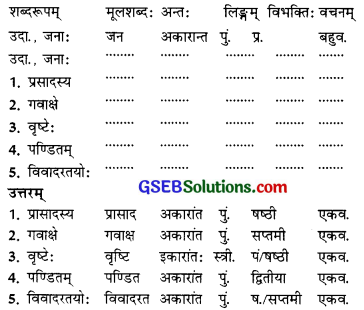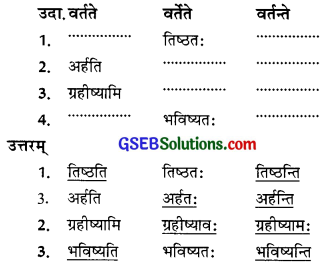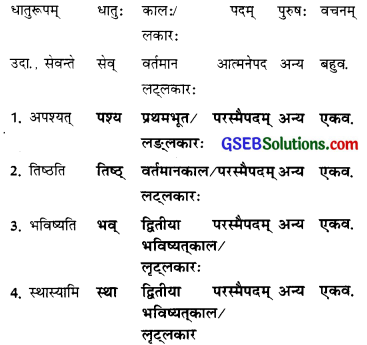Gujarat Board GSEB Solutions Class 9 Sanskrit Chapter 3 परं निधानम् कः Textbook Exercise Important Questions and Answers Notes Pdf.
Gujarat Board Textbook Solutions Class 9 Sanskrit Chapter 3 परं निधानम् कः
GSEB Class 9 Sanskrit परं निधानम् कः Textbook Questions and Answers
1. अधोलिखितेभ्यः विकल्पेभ्यः समुचितम् उत्तरं चिनुत –
Choose the correct answer from the given alternatives.
1. अहं घटपण्डितः ………………….।
(क) स्मः
(ख) अस्मि
(ग) अस्ति
(घ) सन्ति
उत्तरम्:
(ख) अस्मि
2. ‘वायुः’ इति शब्दस्य पर्यायशब्द: क:?
(क) वाक्
(ख) वा
(ग) वातः
(घ) वह्निः
उत्तरम्:
(ग) वातः
![]()
3. ‘गवाक्षः’ इति शब्दस्य अर्थः कः?
(क) peak
(ख) terrace
(ग) court
(घ) balcony
उत्तरम्:
(घ) balcony
4. भूपाल: मार्गे सुवर्णखण्डम् ………………… ।
(क) अक्षिपन्
(ख) अक्षिपसः
(ग) अक्षिपत्
(घ) अक्षिपम्
उत्तरम्:
(ग) अक्षिपत्
5. संसारे कीदृशं जनं पराजेतु कोऽपि न अर्हति?
(क) धनिकम्
(ख) सन्तुष्टम्
(ग) वाचालम्
(घ) बलिष्ठम्
उत्तरम्:
(ख) सन्तुष्टम्
6. अहं दानं ………………… |
(क) करिरष्यति
(ख) करिष्यामि
(ग) करिष्यसि
(घ) करिष्यन्ति
उत्तरम्:
(ख) करिष्यामि
![]()
7. कस्य शिखरे मुकुटं सदा तिष्ठति?
(क) मस्तके
(ख) मस्तकस्य
(ग) मस्तकं
(घ) मस्तकात्
उत्तरम्:
(ख) मस्तकस्य
2. संस्कृत भाषया उत्तरं लिखत –
Write answers of the given questions in sanskrit.
1. अग्निः किं भस्म करोति।
उत्तरम्:
अग्निः मुद्गरं भस्म करोति।
2. राहुः केन शान्तः भवति?
उत्तरम्:
राहुः दानग्रहणेन शान्तः भवति।
3. सन्तोष एव कस्य परं निधानम्?
उत्तरम्:
सन्तोष एव पुरुषस्य परं निधानम्।
![]()
4. भ्रमरः कुत्र बन्दी भवति?
उत्तरम्:
भ्रमरः पुष्पस्य अन्तर्भागे बन्दी भवति।
3. उदाहरणानुसारं शब्दरूपाणां परिचयं लिखत –
Write word form according to example.

4. वचनानुसारं धातुरूपैः रिक्तस्थानानि पूरयत –
Fill in the blanks by root verbs according to number.

5. शीर्षकानुरूपं धातुरूपाणां परिचयं लिखित
Recognize the forms filling in the details under the given headings.

6. कोष्ठकेषुप्रदत्तानि पदानि प्रयुज्य संस्कृतवाक्यानि रचयत –
Construct Sanskrit sentences using the words given in the brackets:
1. The king sees a youth. (नृप, युवक, दृश-पश्य)
उत्तरम्:
नृपः युवकं पश्यति।
2. People go to the assebly. (जन, सभा, गम्-गच्छ्)
उत्तरम्:
जनाः सभा गच्छन्ति।
3. Virtues are worshipped in Dharadesha. (धारादेश, गुण, पूजा, भू)
उत्तरम्:
धारादेशे गुणानां पूजा भवति।
4. Bhoja was favourite among his people. (भोज, प्रजा, प्रिय, भू)
उत्तरम्:
भोजः प्रज्ञासु प्रियः आसीत्।
![]()
5. Agni (fire) burns the hammer. (वह्नि, मुद्गर, दह्)
उत्तरम्:
वह्निः मुद्गरं दहति।
7. मातृभाषायामू उत्तरत
Answer in Mother tongue.
1. How was king Bhoja?
Answer:
King Bhoja was a lover of learning and fine arts. He was devoted to his subjects. He appreciated scholars and artists. He was also a brilliant conversationalist.
2. Why does the youth believe himself to be Ghatapandita.
Answer:
The youth believed himself to be घटपण्डित because according to him he was full of knowledge as a pitcher filled with water up to its brim.
3. When does the discussion between king Bhoja and the youth stop? Why?
Answer:
When the topic of contentment came up is the discussion the discussion stopped, when contentment comes, everything becomes calm and quiet. Accordingly then urge to excel also subsided. The discussion stopped.
![]()
4. What was the specialty of Dharadesha?
Answer:
The merit or quality was worshipped in the kingdom of UTT. King Bhoja respected scholars and artists As it is said ‘यथा राजा तथा प्रजा’ the people also appreciated and respected virtues.
GSEB Class 9 Sanskrit परं निधानम् कः Additional Important Questions and Answers
1. पात्रेण सह समुचिताम् उक्तिं योजयत
Match the characters and their speech:

उत्तरम्:
1. भोजः – एव भवान् द्विरेफ: तर्हि अहं सूर्यः। पुष्पस्य अन्तः स्थितः भ्रमरः सूर्यास्तकाले बन्दी भवति, अहमपि त्वां बन्दिनं करिष्यामि।
2. युवकः – यथा घटे परिपूर्णं जलं तिष्ठति, तथैव मयि परिपूर्ण ज्ञानं वर्तते, अतः अहं स्वात्मानं घटपण्डितं मन्ये।
परं निधानम् कः Introduction:
This lesson is an extract from a very famous work भोजप्रबध by बल्लालकावे Here king भोज gets drawn into a verbal duel with a young stranger by chance. His initial response seems to be scornful. But the stranger is not intimidated when the king says he is like a hammer that can break or destroy the pitcher what begins as a fight or clash of egos slowly develops into a pleasant game of brilliant verbal strokes. While reading the story add details and colours using your imagination. Visualise the expressions on their faces, The match ends in a draw when the topic of contentment comes up and both the players appear to shake hands.
परं निधानम् कः Prose, Translation And Glossary
भोजः नाम नृपतिः विद्याप्रियः, कलाप्रियः, प्रजाप्रियश्च आसीत्। अतः तस्य राजसभायां दूरदेशात् अनेके विद्याविशारदा पण्डिताः समागच्छन्ति स्म।
Translation : A king named भोज was the lover of learning, lover of fine arts and devoted to subjects. So many scholars, expert is lores used to come to his royal assembly from far-off countries.
एकदा भोज : प्रासादस्य गवाक्षे उपविष्टः आसीत्। सः मार्गे एकं नवागन्तुकम् अनभिज्ञं युवकं पश्यति। तस्य परिचयं ज्ञातुं सः तं प्रासादे आह्वयति। ततस्तयोः मध्ये एवं वार्तालाप: संजातः।।
Translation : Once भोज was seated in the round window of the palace. He see a newly arrived, unacquainted young man is the street. He calls him into the palace in order to know who he is. Then between them the conversation took place in this way:
भोजः – भवान् कः वर्तते?
91151: – Who are you?
युवकः – अहं घटपण्डितः अस्मि।
Young man : I am घटपण्डित।
भोजः – घटपण्डितः? किं नाम घटपण्डितः इति?
भोज : घटपण्डित? What indeed does घटपण्डित mean?
युवक : – यथा घटे परिपूर्णं जलं तिष्ठति, तथैव मयि परिपूर्ण ज्ञानं वर्तते। अतः अहं स्वात्मानं घटपण्डितं मन्ये।
![]()
Young man : Just as there is water filled up its brine in the pitcher, in the same way there is full knowledge in me. So I consider myself to be घटपण्डित।
भोज – (युवकस्य गर्वपूर्णाम् उक्तिं श्रुत्वा स्वात्मानं ततोऽप्यधिकं मत्वा अहङ्कारेण सह) यदि त्वं घटः असि, तर्हि अहं मुद्गरत्वेन वर्ते। मुद्गरः स्वकीयेन प्रहारेण घटं विनाशयति। अहमपि घटरूपं भवन्तं विनाशयामि।
भोज – (Listening to the proud speech of the young man and thinking himself to be better than him proudly) if you are a pitcher, I am a hammer. The hammer breaks the pitcher
युवकः – (मनसा विष्णुं प्रणम्य च पण्डित्यं प्रदर्शयन् अग्रे वदति। यदि भवान् चक्रधरः विष्णुः, तर्हि अहं भवतः मस्तकस्य उपरि शोभमानं मुकुटं अस्मि। मुकुटं सदा मस्तकस्य उपरि एव संतिष्ठते।
Young man : (Bowing down to fou mentally and displaying scholarship continues )if you are faros holding 26, I am the crown that looks beautiful on your head. The crown always stays on the head.
भोजः – (युवकस्य पण्डितयम् अनुभूय) तर्हि मुकुटस्य उपरि शोभमानं पुष्पमहम्। एवमहं अधुना तवोपरि स्थास्यामि।
भोज – (Experiencing the scholarship of the young man) then I am the flower looking beautiful on the crown. In this way I shall be above.
युवकः – भवान् यदि पुष्पं भविष्यति, तर्ह अहमपि भ्रमरो भूत्वा तव पुष्पस्योपरि स्थास्यामि। Young man : If you become the flower. I shall also become a bee and be on your flower.
भोजः – एवं भवान् द्विरेफः तर्हि अहं सूर्यः। पुष्पस्य अन्तः स्थितः भ्रमरः सूर्यास्तकाले बन्दी भवति, अहमपि त्वां बन्दिनं करिष्यामि।
भोजः In this way if you are bee, I am the sun. The bee that is inside the flower becomes a prisoner there at the time of the sunset. I, too will make you a prisoner.
![]()
युवकः – अहो! भवान् सूर्यस्तर्हि अहं महाप्रभावी राहुः। राहुस्तु सूर्य ग्रसते।। Young man : Oh! If you are the sun. I am very powerful T and TE swallows the sun.
भोजः – (किञ्चित् उच्चैः) भवान् राहुश्चेत् अहं राहुरूपाय तुभ्यं दानं दास्यामि। दानग्रहणेन तवायं गर्व: निश्चयेन शान्तः भविष्यति।
भोज : (In a slightly loud voice) if you are राहु, I will give money to you who has assumed the form of t. This pride of yours will surely be subdued.
युवकः (विहस्य चातुर्येण) यदि भवान् दानी तर्हि अहं सन्तुष्टः। भवतः दानस्य प्रयासः निष्फलः भविष्यति। सर्वतः अलुब्धः अहं भवतः दानं न ग्रहीष्यामि।
Young man : (Smiling cleverly) if you are practise charity then i am the one who is contented. Your effort of charity will be fruitless. Being absolutely free from greed, I shall not take money offered by way of charity from you.
एवमुत्तरोत्तरं विवादरतयोः भोजयुवकयोः मध्ये यदा सन्तोषस्य विषयः समुपस्थितः तदा ‘समागते संतोषे सर्व शान्तं भवति’ इति वचनानुसार विवादोऽपि स्वयमेव शान्तः। अन्ते चतुरं ज्ञानेन गुणेन च उपेतं तं पण्डित युवकं प्रणम्य धाराधिपतिः भोजराजः अवदत् “अयि घटपण्डित! गुणपुजके धारादेशे भवतः स्वागतमस्ति। भवान् विजयी जातः। सन्तुष्टं जनं न कोऽपि पराजेतुमर्हति। यतो हि सन्तोष एव पुरुष्स्य परं निधानं वर्तते।”
In this way during the course of argument going on between 1 and the young man engrossed in controversy. When the topic of contentment came up, according to the maxim, “When contentment comes, everything becomes quiet”, the argument also automatically stopped.
Finally bowing to the young scholar who was clever and endowed with knowledge and virtue भोजराज, the ruler of धारा, said, “O घटपण्डित, you are welcome in the kingdom of धारा that is the worshipper of quality (ar merit). You have become victorious. No one can defeat a person who is contented. Because indeed contentment is the great treasure of man.”
Glossary : नृपतिः – नृणाम् नृणाम् वा पतिः – षष्ठी तत्पुरुष समास – king, विद्यप्रियः – विद्या प्रिया यस्य सः – बहुव्रीहि समास; lover of learning, कलाप्रियः – कला प्रिया यस्य सः – बहुव्रीहि समास – the lover of fine arts, प्रजाप्रियश्च – प्रजाप्रियः + च and fond or (or devoted to) subjects, आसीत् – was, the verb of the subject भोजः, अतः – so; this is an indeclinable, राजसभायाम् – राज्ञः सभा, तस्याम्, षष्ठी तत्पुरुष समास in (his) court or in the royal assembly, दूरदेशात् – from far-off country, अनेके – many, विद्याविशारदाः – विद्यायाम् विद्यासु वा विशारदाः – सप्तमी तत्पुरुष expert is knowledge or lares, समागच्छन्ति स्म – समागच्छन्, present tense verb followed by the indeclinable’ ‘ expresses past tense or habitual past tense, came or used to come, verb of the subject पण्डिताः।
प्रासादस्य – of the palace, गवाक्षे – is a round window, उपविष्टः – sitting one who was sitting, adjective of भोजः, नवागन्तुकम् – नवः आगन्तुकः, तम्-कर्मधारय समास a new visitor आगन्तुक means one who arrives uninvited, अनाभिज्ञम् – न अभिज्ञ, तम् ignorant, unacquainted, adjective of the noun ‘युवकम्’, ज्ञातुम् – to know, ज्ञा (9U) infinitive or तुमन्त अव्यय, प्रासादे – in the palace, आह्वयति — calls, invites, आ + ह्वे (1U) P, लट् लकार present tense, third person singular, ततस्तयोः – ततः + तयोः, then between both of them, वार्तालाप: – वार्तायाः आलापः, षष्ठी तत्पुरुष समास, conversation, संज्ञातः – समजायत, took place संजातः – सम् + जन् – संज्ञा (4A), intransitive root, past active participle masculine nominative singular.
![]()
भवान् कः वर्तते – who are you? भवान् भवत् ((Pronoun), masculine nominative singular. The pronoun ‘भवान्’ takes the third person verb ‘त्वम्’ requires the second person pronoun; so भवान् किं पठति, but त्वम् किं पठसि? घटपण्डितः — scholar like a pitcher (filled with knowledge), अस्मि – (I) am, किं नाम – why indeed, परिपूर्णम् – perfect, brimful, adjective of’जलम्’, तिष्ठति – अस्ति, is, स्वात्मानम् – myself, मन्ये – I consider/think.
गर्वपूर्णम् – गर्वेण पूर्णा, ताम्- तृतीया तत्पुरुष समास, filled with pride, adjective of the feminine noun _ ‘उक्तिम्’, श्रुत्वा – having heard, श्रु (5P) त्वान्त gerund (संबंधक भूतकृदन्त), तेतोऽप्यधिकम् – तत् + अपि +
अधिकम् more than him, मत्वा – having thought, मन् (4A), त्वान्त् gerund, अहङ्कारेण सह – proudly, यदि – if, तर्हि – then, ‘यदि’ and ‘तर्हि’ are indeclinables, मुद्गरत्वेन – like a hammer, वर्ते – I am, वृत् (1A) लट् लकार present tense first person singular, verb of the subject ‘अहम्’, स्वकीयेन – with/by own, adjective of the noun ‘प्रहारेण’, विनाशयति – breaks वि + नश् (4P) प्रेरक लट् लकार causal present tense, third person singular, घटः विनशयति – is the primary sentence, मुद्गरः घट विनाशयति – is a casual sentence, घटरूपम् भवन्तम् – you is the form of pitcher, object of the verb, विनाशयामि, विनाशयामि – I(shall) destroy, verb of the subject अहम्.
वर्तिष्यते – (you) will be, verb of the subject भवाम् – compare त्वम् वर्तिष्यसे, भवान् वर्तिष्यते, दहनकर्मा – दहनम् कर्मयस्च सः – बहुव्रीहि समास, who burns, adjective of the noun अग्नि, भूत्वा – becoming, भस्म करिष्यामि – I shall reduce to ashes, वह्नित्वेन – in the form of fire, भविष्यामि — I shall be, वृष्टेः पुरतः – in front of shower or rainfall, पुरतः, पुरः अग्रतः, अग्रे, समीपे, अन्तिके, निकटे, अधः, उपरि are indeclinable that are used with the genitive case. Other examples: गृहस्य समीपे नदी वहित। वृक्षस्य अधः पान्थः शेते। स्थातुम् – to stand, स्था – तिष्ठ (1P) infinitive or त्वान्त अण्यय, न शक्नोषि – (you) cannot, वाहयितुम् – to blow, वह – (1P) प्रेरक causal infinitive तुमन्त, अव्यय, अर्हति – is able, verb of the subject वायुः, वृष्टिरूपम् भवन्तम् – to you is the form of rain, इतः ततः – here (and) there, वक्ष्यामि – I (shall) blow on carry. (in the textbook there is, ‘वहिष्यामि’ which actually should have been ‘वक्ष्यामि’.
तातत्वेन – is the form of wind, वायुभक्षकः – वायोः भक्षकः – षष्ठी तत्पुरुष समास one who eats wind, adjective of the noun ‘भुजंगः’, भुजगः सन् – being a snake, भक्षयिष्यामि – I shall eat, भक्ष् (100) P, लृट् लकार – second future tense first person singular, सर्पभक्षकः – सर्पस्य भक्षकः – षष्ठी तत्पुरुष समास, one who eats a snake, adjective of the noun ‘गरुड़:’, वाक्केलीम् – वाचः केली, ताम् – षष्ठी तत्पुरुष समास play of words, वर्धयन् – taking ahead, carrying on वृध् (1A) प्रेरक casual present active participle, masculine nominative singular.
असि – you are; verb of the subject ‘त्वम्’, चक्रधारकः – चक्रस्य धारक:- षष्ठी तत्पुरुष Lord ‘विष्णु’ who holds सुदर्शन चक्र adjective of the noun विष्णु, मनसा – with mind, मनस् (neuter noun ending is स् instrumental singular, प्रणम्य – bowing down to, प्र + नम् (1P) ल्यबन्त (संबंधक भूतकृदन्त) gerund, गरुडारूढ़ः – गरुडम् आरूढ़ः – द्वितीया तत्पुरुष समास, riding on the eagle, adjective of the noun विष्णु, पण्डित्यम् – scholarship, प्रदर्शयन् – displaying, प्र + दृश्य (1P) प्रेरक वर्तमान कृदन्त, प्र + दृश्य (1P) प्रेरक वर्तमान कृदन्त – causal present active participle, masculine nominative singular, मस्तकस्य उपरि – on the head, the indeclinable ‘उपरि’ used with the genitive case.
शोभमानम् – looking beautiful, adjective of the noun ‘मुकुटम्’ शुभ् – शोभ् (1A) present active participle, neuter nominative singular, संतिष्ठते – is; सम् + स्था – संतिष्ठ् (1A) लट् लकार, present tense third person singular verb of the subject ‘मुकुटम्, अनुभूय – having experienced, अनु + भू (1P) ल्यबन्त (संबंधक भूतकृदन्त) gerund, पुष्पमहम् – पुष्पम् + अहम् I (am) a flower, अधुना – now, this is an indeclinable, तवोपरि – तव + उपरि, on you, स्थास्यामि – I shall be, स्था (1P) लृट लकार- second future tense, first person singular, verb of the subject ‘अहम्’, एवम् – in this way, this, this is an indeclibable, द्विरेफ: – honeybee, black bee द्वौ रेफौ यस्मिन् सः- बहुव्रीहि समास – is whose name there are two 2s i.e., भ्रमरः, पुष्पस्य अन्तः – inside the flower, स्थितः – being lying; पुष्पस्य अन्तः स्थितः is the adjective phrase qualifying the noun भ्रमरः, सूर्यास्तकाले – at the time of sunset, बन्दी – a prisoner, बन्दिन्, (adjective ending in इन्) masculine, nominative singular, बन्दिनम् prisoners बन्दिन(adjective ending in 51) masculine accusative singular adjective of all which is the object of the verb करिष्यामि so it is in the accusative case, महाप्रभावः – very powerful.
![]()
महान प्रभावः यस्य सः – बहुव्रीहि समास, adjective of, राहुः राहुस्तु – राहुः + तु, but Rahu; राहु is regarded as one of the nine planets, g is also a demon who is responsible for solar and lunar eclipses, wat – swallows, eats ग्रस् (10) A present tense third person singular, verb of the subject राहु:, किञ्चित् उच्चैः – in a slightly loud voice, राहुश्चेत् – राहुः – चेत्. if (you are) राहु, चेद् is the correct form, not चेत् चेद् is an indeclinable that is not used in the beginning of a sentences. It means if., राहुरूपाय तुभ्यम् — to you who is in the form of राहु, तुभ्यम् is the dative case because the receipient is always in the dative case, दानम् दास्यामि – I shall give money.
‘दानम् करिष्यामि’ – is the correct usage, दास्यामि – दा (1P, 3U) P, लृट् लकार – second future tense. First person singular, verb of the subject, ‘अहम्’, दानग्रहणेन – by accepting money, दानस्य ग्रहणम् तेन – षष्ठी तत्पुरुष समास, तवायम् – तव + अयम्, this (pride) of yours, निश्चयेन – surely, विहस्य – smiling, वि + हस् (1P) ल्यबन्त (संबंधक भूतकृदन्त) gerund, चातुर्येण – cleverly, सर्वतः – completely, lit. form all sides, this is an indeclinable, भवतः – from you, भवत् (pronoun) masculine, ablative singular, अलुब्धः – one who is not greedy, न लुब्धः – नत्र तत्पुरुष समास, adjective of अहम्, न ग्रहीष्यामि – I shall not take; ग्रह (9U) P- लृट् लकार – second future tense, first person singular.
एवमुत्तरोत्तरम् – एवम् + उत्तरोत्तरम्, thus more and more, everincreasing, विवादरतयोः – विवादे रतो, तयौः – सप्तमी तत्पुरुष समास, engrossed in argument adjective of भोजयुवकयोः, भोजयुवकयोः – भोजः च युवक : च, तयोः इतरेतर द्वंद्व समास, between भोज and the young man, सन्तोषस्य विषयः – the topic theme of contentiment, समुपस्थितः – came up, arose, समागते संतोषे – when contentment came. This locative absolute construction, (सति सप्तमी) can be replaced by ‘यदा संतोषः समागतः तदा, वचनानुसारम् – वचनस्य अनुसार यस्मिन् कर्मणि यथा स्यातथा – अव्ययीभाव समास, according to the saying, स्वयमेव – स्वयम् + एव – spontaneously.
This is an indeclinable, शान्तः – subsided, ended शम् (4P) intransitive root, past active participle (कर्तरि भूतकृदन्त) masculine nominative singular, अन्ते – finally, उपेतम् – endowed, ज्ञानेन गुणेन च उपेतम् – endowed with knowledge and virtue, adjective phrase qualifying the noun युवकम्, धाराधिपतिः – धारायाः अधिपतिः षष्ठी तत्पुरुष समास, the king of धारानगरी, adjective of भोजराजः, गुणपूजके – गुणस्य पूजकः, तस्मिन् – षष्ठी तत्पुरुष समास is the (kingdom of धारा which is) the worshiper of quality of merit, विजयी जातः – you have become (जातः), victorious, पराजेतुर्महति – पराजेतुम् + अर्हति able to defeat, यतः – because, हि – indeed, परं निधानम् – the great treasure, वर्तते – अस्ति is.